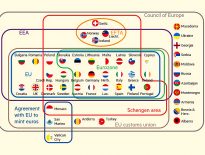Election A to Z — S is for Scotland

Contents
Winners
The only certain winners from this general election are the SNP. Polls predict that they will increase their share of Scotland’s 59 seats from 6 to more than fifty, despite attracting only around 4% of the national vote. Even more significantly, if Labour can make it to around 270 seats, between them they will have a workable majority in the Commons. ((In practice, since Labour has ruled out a deal with the SNP, this would mean a minority Labour government supported on a vote by vote basis by the SNP – as long as the SNP abstain in any no-confidence motions, this arrangement could last for five years))
Back in September 2014, when the SNP lost the referendum on independence by a clear 10%, this didn’t seem likely. But the party atmosphere north of the border apparently converted many lifelong Labour voters, who have not returned to the fold for the multi-issue vote.
Losers
The big losers from this are Labour. Not because of the short-term loss of seats, but beacuse of the influence the SNP might have on a Labour minority government, and also because of the long-term implications of the SNP controlling Scotland.
In recent years the SNP has been a left-wing party. This was a pragmatic move driven by the nature of the available voters, in much the same way that UKIP has redefined itself in order to attract disillusioned Labour voters in the north of England.
The new SNP leader, Nicola Sturgeon, is even more left wing than the outgoing Alex Salmond. So in the short-term, the SNP could drag Labour leftward.
Sturgeon would demand higher welfare spending, the cancellation of a replacement for the UK’s nuclear deterrent (Trident) and the closure of the NHS to private-sector providers. Of course, since she is committed to opposing the Tories, her bargaining power with Labour could be limited.
But worse than the short-term leftward drift would be the constant suspicion in England of Scottish favouritism. The mansion tax, applying mostly in London but trumpeted by the Scottish Labour leader as funding nurses in Scotland, is an obvious example.
Salmond has already insisted that the fiscal independence the SNP demands for Scotland should not affect the existing subsidy that Scotland receives from the UK under the Barnett formula. So a fiscally independent Scotland would continue with higher per capita spending without having to deal with the consequences. Instead of higher Scottish taxes, they will spend UK cash.
The SNP have nothing to lose – the more they can extract from the UK, the weaker they can make it seem, the greater is the attraction of breaking free.
The Tories have already used the threat of a separatist party having influence during the election campaign. Over five years in opposition, they can be expected to taint Labour forever as collaborators. At the end of the next parliament, Scottish Independence would be back on the agenda. And without Scotland, Labour cannot realistically expect to return to government.
No better with Cameron
If Labour can’t reach 270 seats, there are at least a couple of ways in which a Conservative-led coalition could also stoke up Scottish independence:
- the Tories will probably have only one Scottish seat, and so the SNP will question the legitimacy of Cameron’s government ((In much the same way that many in England question the right of a separatist party to govern))
- an exit vote in the EU referendum would inevitably lead to another independence referendum, as the Scots want to remain in the EU
The most dangerous woman in Britain
For someone who will not be an MP after the election, Sturgeon has had a good campaign. Little known outside Scotland until she took over from Salmond after his defeat in the independence referendum, she emerged into the national spotlight after a good performance in the bizarre seven-way party leader TV “debate”.
Her key setback was the leak from the foreign office of a diplomatic memo claiming she had told the French ambassador that she would prefer that Cameron remain as PM, since Milliband wasn’t “prime minister material.”
Labour had a go at making a “Tartan Tories” jibe stick, but Sturgeon’s determination to bring down this Tory government appears to have worked in the court of public opinion. Many political commentators still feel that Sturgeon’s anti-austerity, anti-Westminster message would play better if the Tories were in government.
The SNP as government
The SNP’s record in government is not great:
[space]
- the schools remain poor
- the NHS is protected from competition and has not improved
- the free university places have failed to attract working-class students
- almost half the further education colleges have been closed
- they have centralised the police forces into a single unit
- council tax has been frozen, limiting local councils’ flexibility
And that is with the support of the rest of Britain. Of course, a key flaw in devolution is that it allows the Scottish government to blame Westminster for everything.
An independent SNP government, with dwindling returns from North Sea oil, and higher interest rates from a worse credit rating, would have significantly less to spend. The Scottish budget deficit is already twice the size of Britain’s, and things would only get worse.
If the SNP attempt to raise taxes to balance the books, companies and skilled labour will leave, to be replaced by welfare migrants attracted by the benign regime. A small country next to a larger richer country has few options.
Yet as their economic case grows weaker, the popularity of the SNP grows. The magic money tree effect.
Time to say goodbye
The Scots want to have their haggis and to eat it. They want a welfare paradise, but they want the rest of us to pay for it. They have no interest in the success of the UK, but only in the money they can extract from us.
A recent Economist poll highlighted that the rest of the UK is running out of patience:
- More people now believe that Scotland will be independent within 20 years than do not, although only 20% think this would be a good thing.
- More significantly, 70% think Scotland already has a good deal (only 8% think it has a bad deal), and 70% would not pay any more to see it stay (or indeed, to help it go).
If Scotland votes in an SNP landslide, we should wave them goodbye.
It’s time for another independence referendum. But this time everyone in the UK should have a vote.
To see more of our election coverage, please go to our Election A to Z page.
Until next time


















Hi Mike
Just discovered your site and have spent most of the evening reading it.
As someone who has lived in Scotland all my life, your analysis of the situation is Scotland is excellent.
At present, thanks to the Barnet formula, Scotland gets a vast annual subsidy from the UK (around £8bn a year if my memory serves me correctly). Yet, around 45% of Scots have been hoodwinked (yes, in some quarters it’s more like a cult than a rational decision) into believing that after independence the streets will be paved with gold.
The reality is rather different. Fiscal independence (let alone full independence) would require vast budget cuts of perhaps 10%.
In recent years, oil tax revenue has collapsed by more than 95%. And given the rate of growth in solar power, it may never recover.
As you mentioned, higher state spending in Scotland has resulted in a budget deficit of almost 10% per year, around twice the current UK deficit.
Even worse, the Scottish tax base is much narrower than the rest of the UK. Around 3% of Scots (150,000 people) are responsible for half the tax paid. Only 11,000 people in Scotland earn more than £150,000.
As a result, despite having tax altering powers, the SNP daren’t use them.
If they increase taxes, people, businesses and capital will leave Scotland (it would only take a few thousand high taxpayers to seriously damage tax receipts).
Meanwhile, they can’t be seen to reduce taxes given their political leaning to the left to capture labour voters.
Despite their rhetoric, the SNP, Sturgeon and Salmond do not speak for me, or millions of Scots. Their behaviour, which paints Scots as greedy, arrogant and self-obsessed, disgusts me.
The modern SNP is a grievance machine designed to ride the surge in nationalism that invariably follows a financial crisis.
The situation is made even more dangerous by certain characteristics of the Scottish national psyche. There’s a perversity to it, which often makes them their own worse enemy.
For example, 19% of Scotland’s trade is with the EU. And as the UK has voted to leave the EU, how do many Scots respond? By renewing calls to leave the UK, with whom they conduct more than 40% of their trade.
It’s utterly illogical. It’s like losing an arm in an accident and then hacking-off one of your legs just to show everybody how angry you feel about the situation.
Fortunately, the people who dislike the SNP are growing increasingly vocal.
And given the fact that the SNP have been in power at Holyrood since 2007, patience is beginning to grow thin with their record in government.
In the future, I think the general election of 2015 could be seen as peak-SNP.